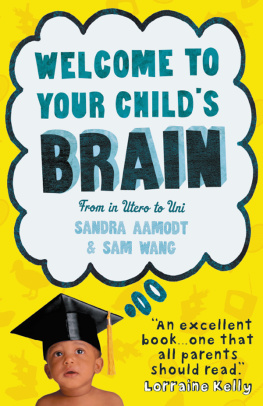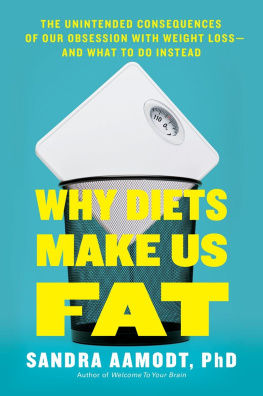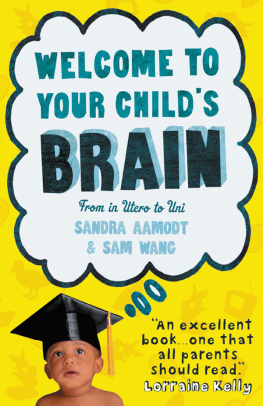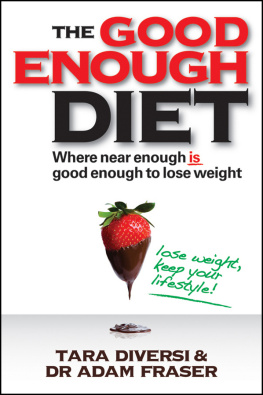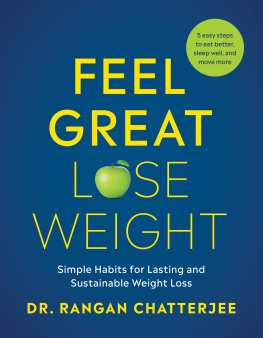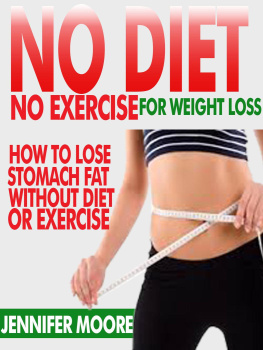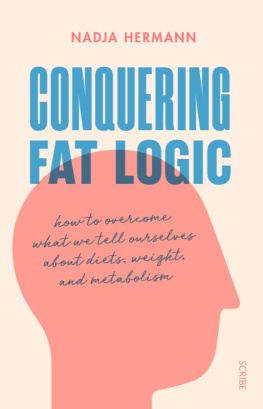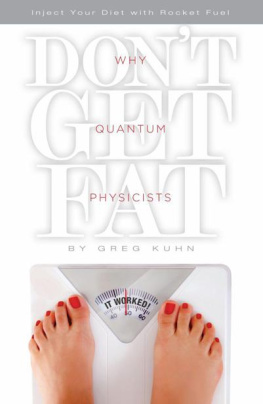CURRENT
An imprint of Penguin Random House LLC
375 Hudson Street
New York, New York 10014
penguin.com
Copyright 2016 by Sandra Aamodt
Penguin supports copyright. Copyright fuels creativity, encourages diverse voices, promotes free speech, and creates a vibrant culture. Thank you for buying an authorized edition of this book and for complying with copyright laws by not reproducing, scanning, or distributing any part of it in any form without permission. You are supporting writers and allowing Penguin to continue to publish books for every reader.
LIBRARY OF CONGRESS C ATALOGING-IN-PUBLICA TION DATA
Names: Aamodt, Sandra.
Title: Why diets make us fat : the unintended consequences of our obsession with weight loss / Sandra Aamodt, Ph.D.
Description: New York, New York : Current, an imprint of Penguin Random House LLC, [2016] | Includes bibliographical references and index. | Description based on print version record and CIP data provided by publisher; resource not viewed.
Identifiers: LCCN 2015048708 (print) | LCCN 2015048518 (ebook) | ISBN 9780698186668 (ebook) | ISBN 9781591847694 (hardcover : alk. paper)
Subjects: LCSH: Weight lossPsychological aspects | Weight gain. | Food habitsPsychological aspects
Classification: LCC RM222.2 (print) | LCC RM222.2 .A225 2016 (ebook) | DDC 613.2/5dc23
LC record available at http://lccn.loc.gov/2015048708
Neither the publisher nor the author is engaged in rendering professional advice or services to the individual reader. The ideas, procedures, and suggestions contained in this book are not intended as a substitute for consulting with your physician. All matters regarding your health require medical supervision. Neither the author nor the publisher shall be liable or responsible for any loss or damage allegedly arising from any information or suggestion in this book.
Version_1
For Elizabeth
Contents
Introduction
S everal years ago, my husband and I visited friends who had two teenage daughters. Both girls were smart, beautiful, and well loved, but only one was thin. Her sister had started gaining weight at puberty, and their parents couldnt figure out what to do. Theyd tried talking to her about portion control and exercise. Theyd tried cooking her special food. Nothing slowed her progression from skinny child to voluptuous woman.
Their well-meaning concern was making the situation worse. She was reluctant to sit down for meals with the familyand ate almost nothing when she did. But her father told me that food was disappearing from the refrigerator in the middle of the night, and her weight gain continued. Rather than making her thin, her parents anxiety was pushing her toward an eating disorder and increasing her odds of gaining more weight.
I understood her feelings because I was that teenage girl myself several decades ago, hating myself because I couldnt satisfy my cultures expectations for my body. Because I grew up to be a neuroscientist, I also knew about the biology behind her struggles. Considerable evidence shows that dietingwillfully eating less to lose weightrarely works in the long run, while its unintended side effects do a lot of harm.
When I discovered this evidence, after three decades of losing the same fifteen pounds again and again, it transformed my relationship with food. At first I wasnt sure that changing my approach would work for me, so I tried an experiment. As my New Years resolution in 2010, I vowed to go an entire year without dieting or weighing myself and to exercise every day. I was so pleased with the results that Ive maintained all three habits ever since. My weight used to bounce around a fifty-pound range as I starved or binged my way through the first half of my adult life, but now it remains stable even though I dont worry about calories anymore. And the research suggests that my experience is typical.
If diets worked, wed all be thin by now. Instead we have enlisted hundreds of millions of people into a war we cant win, fighting not against an external enemy but against our own bodies. In the United States, 108 million people went on a diet last yearand half of them were within the normal weight range when they started. Yet research shows that dieters almost always regain their lost weight within a few years, no matter which diet plan they follow. In fact, they often regain more weight than theyve lost. On average, people who go on a diet end up heavier five years later than people of the same initial weight who didnt diet.
Many people are convinced that unless they control their appetite, they will gain weight, get sick, and die young. This common belief gets it backward. Dieting often makes people fatter and less healthy in the long run because it impairs their ability to recognize hunger, which increases vulnerability to emotional eating and food marketing. Research suggests that the resulting cycle of repeatedly losing weight and gaining it back is no better for health than maintaining a higher weight with a healthy lifestyle. Fitness can overcome most of the health risks associated with obesity and also help prevent future weight gain, but only if people dont quit exercising when they discover that it isnt making them lose weight.
By understanding how the brain regulates weight, we can stop struggling to defeat this control system and learn how to let it help us instead. Just as the body needs a certain amount of sleep, the brain has a body weight range that it prefers and will defend for each individual. The brains weight-regulation system will maintain a stable, healthy weight for most people, if it is allowed to do its job without interference. This system mainly operates beneath conscious awareness, influencing hunger and activity in many ways and also changing metabolism by modifying the amount of energy that muscles burn. Lasting weight loss is hard to achieve because when dieting makes a heavy person thinner, the brain responds exactly as it would if a thin person were starving. The result is a powerful mechanism to keep body weight within a certain range.
The belief that dieting will control weight is not only mistaken but also dangerous. I wrote this book because Ive seen too many healthy children turn into diet-obsessed teenagers who are headed for a lifetime of weight cycling and struggles with food. Parents often unwittingly contribute to these problems by hassling kids about their weight or by setting an example of constant anxiety around meals. With the help of a good therapist, our friends daughter found a better way to relate to food. I want us all to do that, for our children and for ourselves.
Our obsession with weight loss hasnt made us thin or healthy, so its time to try another way. If dieting has failed you, thats not because youre a failure but because your brain is working correctly. To find out what to do instead, read on.
Part One
________
The Trouble with Diets
1
The Diet Roller Coaster
H is oldest daughters wedding was the final straw. Dennis Asbury could avoid looking in mirrors, but he couldnt ask his wife not to hang photos from the celebration on the wall. The truth was staring at him: at age forty-five, he carried 283 pounds on his 59 frame and had a fifty-two-inch waist. Stress at his job as director of environmental services for the town of Eden, North Carolina, had led him to overeat for years. Now the bill had come due. The next week at a checkup, he asked his doctor for help with weight loss.
Like six million other people in the United States, he took home a prescription for fenfluramine-phentermine, better known as fen-phen. The drug combination was everywhere in 1996, after a strong marketing push from its manufacturer, American Home Products, based on a four-year study of only 121 patients. For Dennis, the drugs were a revelation. After taking one pill, he felt like he was in someone elses body. For the first time in years, he could get through an entire thought at work without anticipating his next meal. Encouraged, he plunged into his diet with enthusiasm.


